UMOCB6-15-M Leadership Module Assignment: Reflective Report
VerifiedAdded on 2022/11/29
|14
|5013
|222
Report
AI Summary
This report is a comprehensive analysis of leadership, divided into two parts. Part A uses Kolb's reflective model to examine personal experiences in an organizational setting, focusing on the development of communication, decision-making, leadership, and teamwork skills. It also identifies areas for improvement, such as problem-solving and negotiation. Part B delves into a literature perspective, analyzing leadership through the lens of relational leadership, ethical leadership, and organizational culture. The report explores how leadership styles influence organizational culture and the importance of feedback, autonomy, and employee empowerment. The student reflects on how to apply these concepts to their current and future professional life.
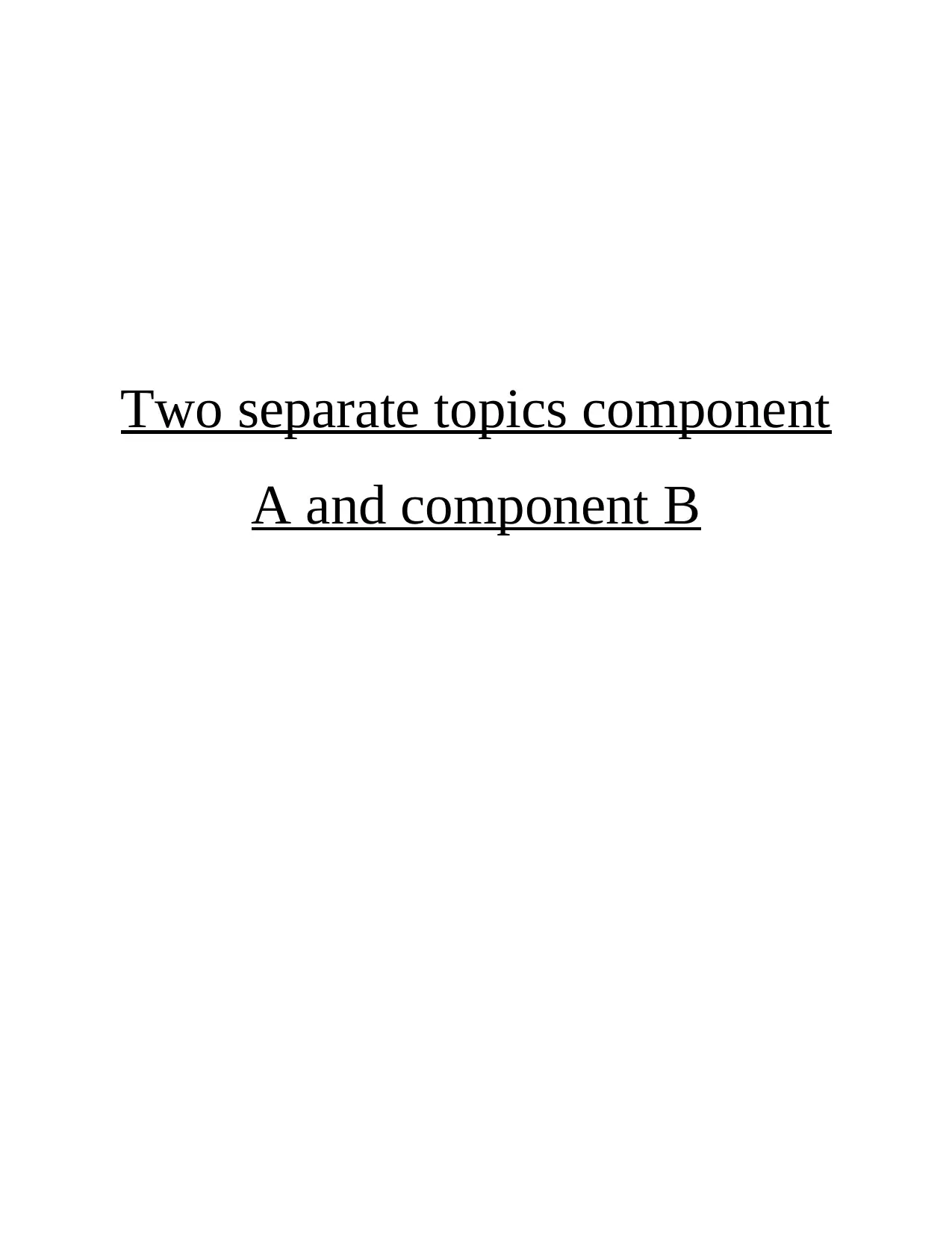
Two separate topics component
A and component B
A and component B
Paraphrase This Document
Need a fresh take? Get an instant paraphrase of this document with our AI Paraphraser
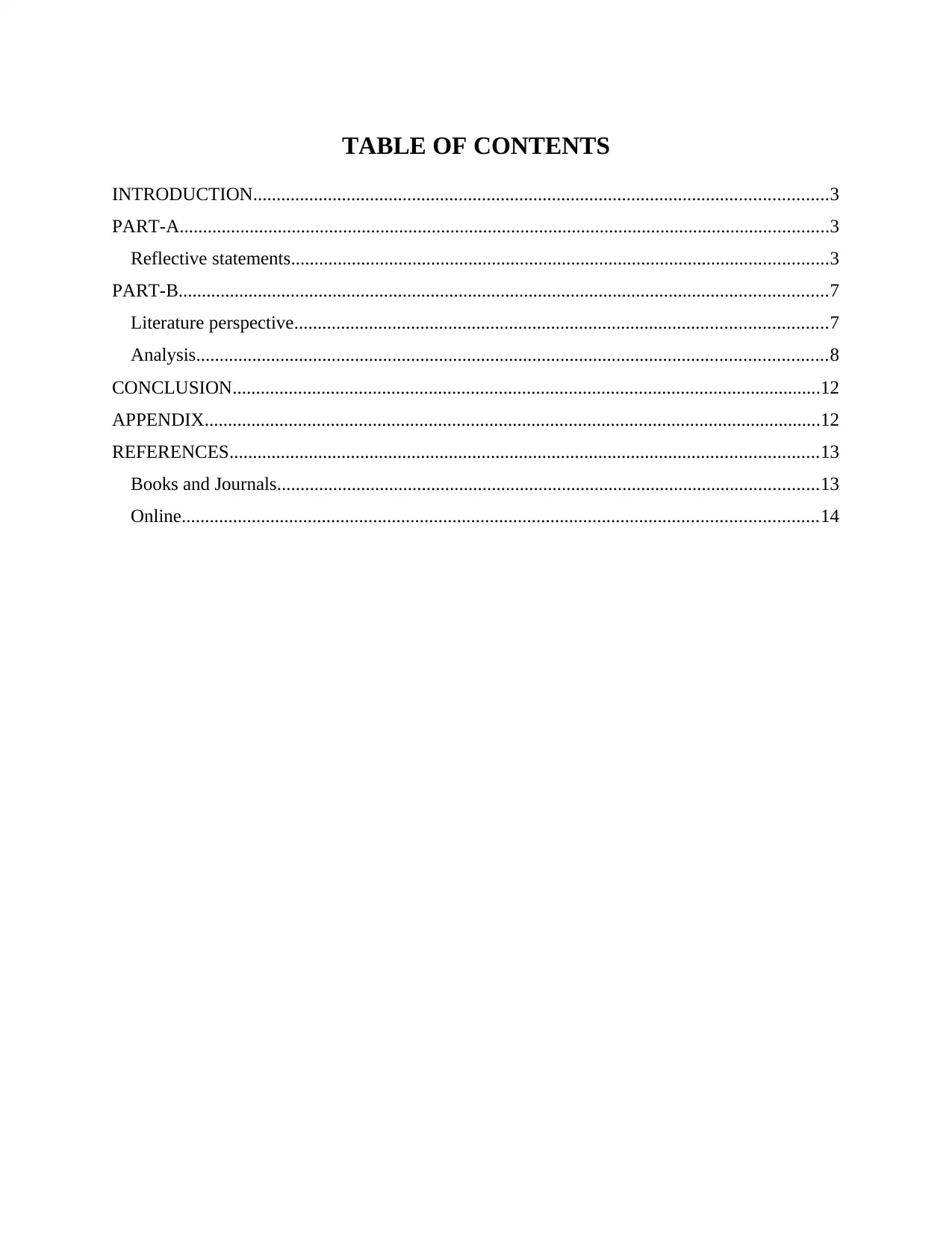
TABLE OF CONTENTS
INTRODUCTION...........................................................................................................................3
PART-A...........................................................................................................................................3
Reflective statements...................................................................................................................3
PART-B...........................................................................................................................................7
Literature perspective..................................................................................................................7
Analysis.......................................................................................................................................8
CONCLUSION..............................................................................................................................12
APPENDIX....................................................................................................................................12
REFERENCES..............................................................................................................................13
Books and Journals....................................................................................................................13
Online........................................................................................................................................14
INTRODUCTION...........................................................................................................................3
PART-A...........................................................................................................................................3
Reflective statements...................................................................................................................3
PART-B...........................................................................................................................................7
Literature perspective..................................................................................................................7
Analysis.......................................................................................................................................8
CONCLUSION..............................................................................................................................12
APPENDIX....................................................................................................................................12
REFERENCES..............................................................................................................................13
Books and Journals....................................................................................................................13
Online........................................................................................................................................14
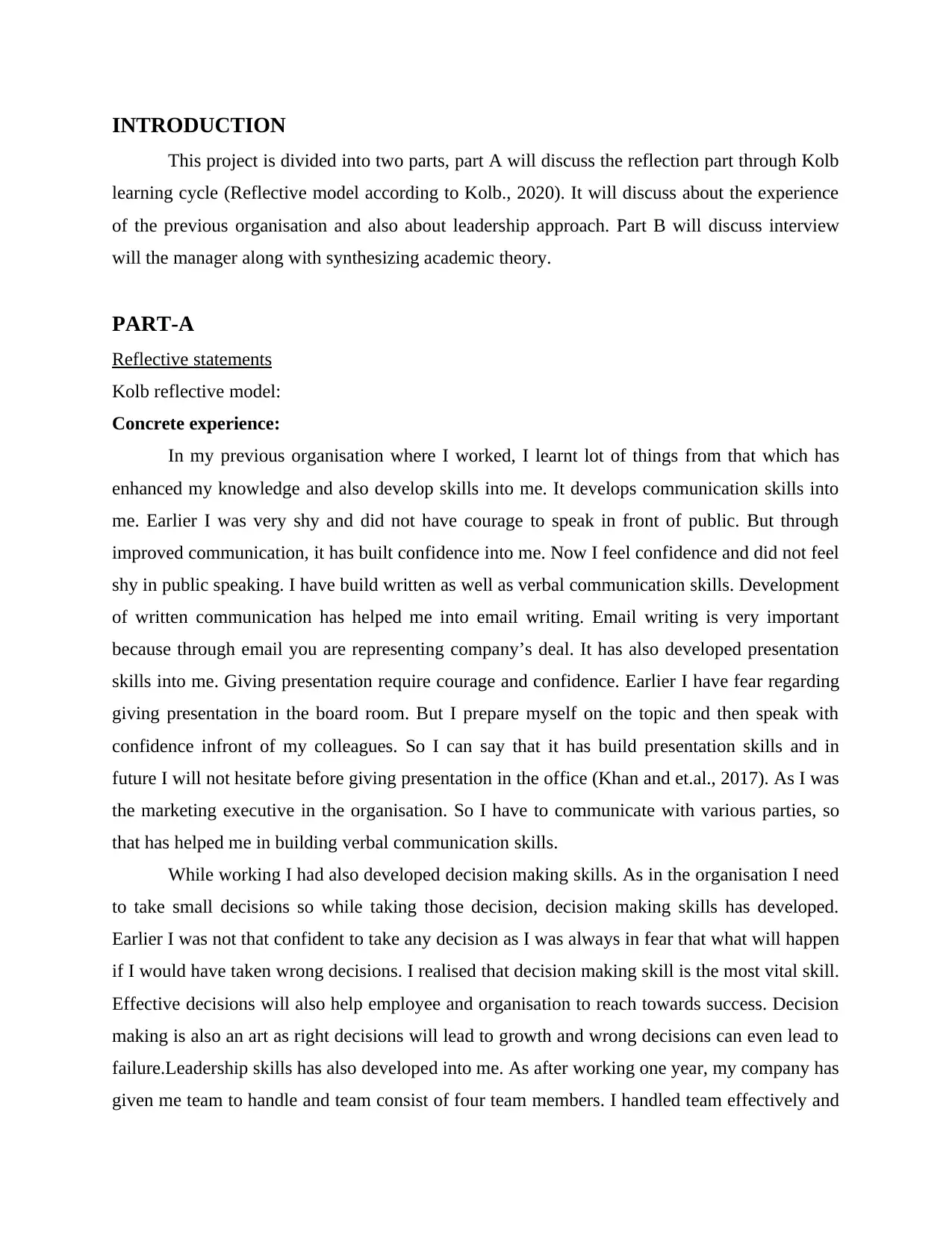
INTRODUCTION
This project is divided into two parts, part A will discuss the reflection part through Kolb
learning cycle (Reflective model according to Kolb., 2020). It will discuss about the experience
of the previous organisation and also about leadership approach. Part B will discuss interview
will the manager along with synthesizing academic theory.
PART-A
Reflective statements
Kolb reflective model:
Concrete experience:
In my previous organisation where I worked, I learnt lot of things from that which has
enhanced my knowledge and also develop skills into me. It develops communication skills into
me. Earlier I was very shy and did not have courage to speak in front of public. But through
improved communication, it has built confidence into me. Now I feel confidence and did not feel
shy in public speaking. I have build written as well as verbal communication skills. Development
of written communication has helped me into email writing. Email writing is very important
because through email you are representing company’s deal. It has also developed presentation
skills into me. Giving presentation require courage and confidence. Earlier I have fear regarding
giving presentation in the board room. But I prepare myself on the topic and then speak with
confidence infront of my colleagues. So I can say that it has build presentation skills and in
future I will not hesitate before giving presentation in the office (Khan and et.al., 2017). As I was
the marketing executive in the organisation. So I have to communicate with various parties, so
that has helped me in building verbal communication skills.
While working I had also developed decision making skills. As in the organisation I need
to take small decisions so while taking those decision, decision making skills has developed.
Earlier I was not that confident to take any decision as I was always in fear that what will happen
if I would have taken wrong decisions. I realised that decision making skill is the most vital skill.
Effective decisions will also help employee and organisation to reach towards success. Decision
making is also an art as right decisions will lead to growth and wrong decisions can even lead to
failure.Leadership skills has also developed into me. As after working one year, my company has
given me team to handle and team consist of four team members. I handled team effectively and
This project is divided into two parts, part A will discuss the reflection part through Kolb
learning cycle (Reflective model according to Kolb., 2020). It will discuss about the experience
of the previous organisation and also about leadership approach. Part B will discuss interview
will the manager along with synthesizing academic theory.
PART-A
Reflective statements
Kolb reflective model:
Concrete experience:
In my previous organisation where I worked, I learnt lot of things from that which has
enhanced my knowledge and also develop skills into me. It develops communication skills into
me. Earlier I was very shy and did not have courage to speak in front of public. But through
improved communication, it has built confidence into me. Now I feel confidence and did not feel
shy in public speaking. I have build written as well as verbal communication skills. Development
of written communication has helped me into email writing. Email writing is very important
because through email you are representing company’s deal. It has also developed presentation
skills into me. Giving presentation require courage and confidence. Earlier I have fear regarding
giving presentation in the board room. But I prepare myself on the topic and then speak with
confidence infront of my colleagues. So I can say that it has build presentation skills and in
future I will not hesitate before giving presentation in the office (Khan and et.al., 2017). As I was
the marketing executive in the organisation. So I have to communicate with various parties, so
that has helped me in building verbal communication skills.
While working I had also developed decision making skills. As in the organisation I need
to take small decisions so while taking those decision, decision making skills has developed.
Earlier I was not that confident to take any decision as I was always in fear that what will happen
if I would have taken wrong decisions. I realised that decision making skill is the most vital skill.
Effective decisions will also help employee and organisation to reach towards success. Decision
making is also an art as right decisions will lead to growth and wrong decisions can even lead to
failure.Leadership skills has also developed into me. As after working one year, my company has
given me team to handle and team consist of four team members. I handled team effectively and
⊘ This is a preview!⊘
Do you want full access?
Subscribe today to unlock all pages.

Trusted by 1+ million students worldwide
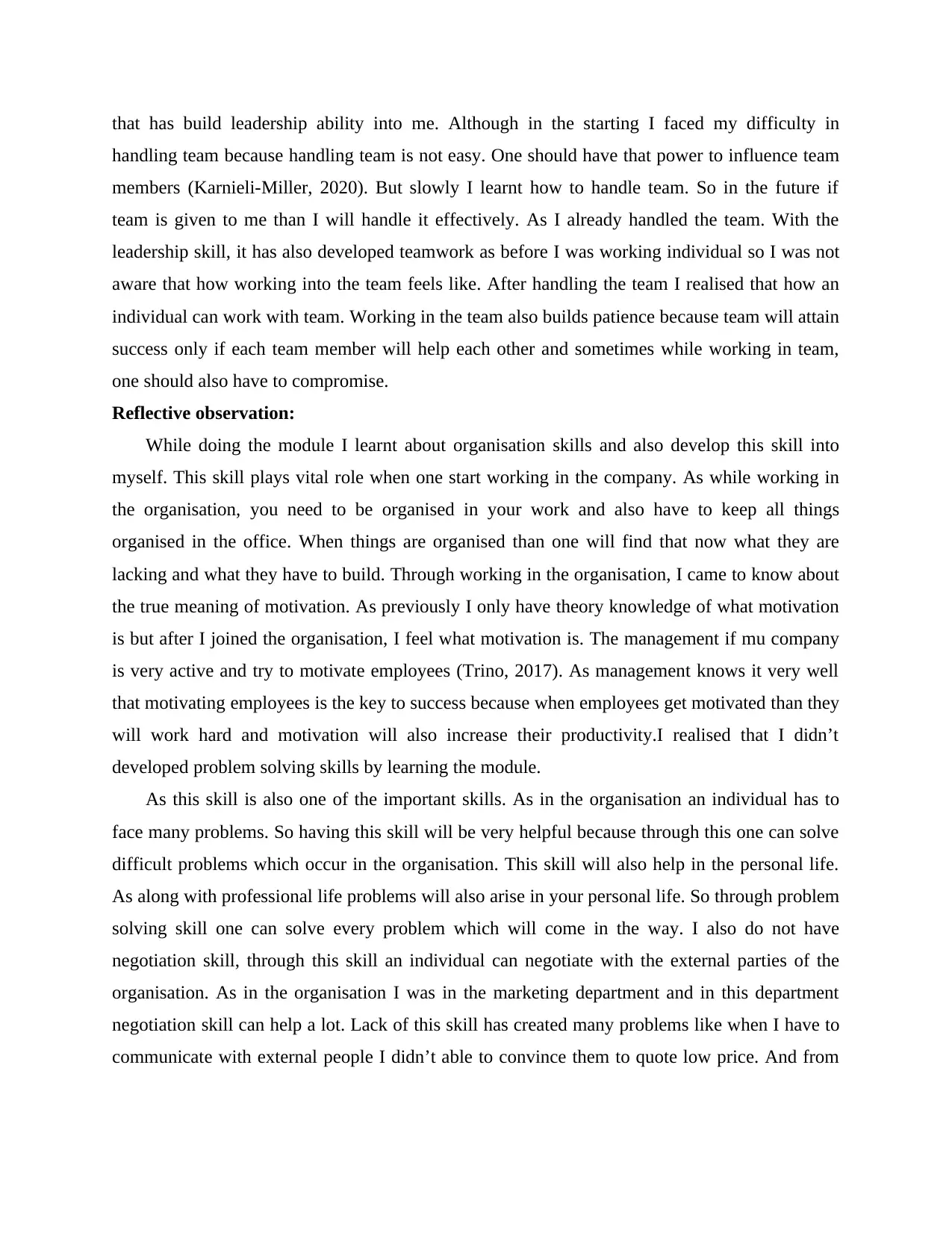
that has build leadership ability into me. Although in the starting I faced my difficulty in
handling team because handling team is not easy. One should have that power to influence team
members (Karnieli-Miller, 2020). But slowly I learnt how to handle team. So in the future if
team is given to me than I will handle it effectively. As I already handled the team. With the
leadership skill, it has also developed teamwork as before I was working individual so I was not
aware that how working into the team feels like. After handling the team I realised that how an
individual can work with team. Working in the team also builds patience because team will attain
success only if each team member will help each other and sometimes while working in team,
one should also have to compromise.
Reflective observation:
While doing the module I learnt about organisation skills and also develop this skill into
myself. This skill plays vital role when one start working in the company. As while working in
the organisation, you need to be organised in your work and also have to keep all things
organised in the office. When things are organised than one will find that now what they are
lacking and what they have to build. Through working in the organisation, I came to know about
the true meaning of motivation. As previously I only have theory knowledge of what motivation
is but after I joined the organisation, I feel what motivation is. The management if mu company
is very active and try to motivate employees (Trino, 2017). As management knows it very well
that motivating employees is the key to success because when employees get motivated than they
will work hard and motivation will also increase their productivity.I realised that I didn’t
developed problem solving skills by learning the module.
As this skill is also one of the important skills. As in the organisation an individual has to
face many problems. So having this skill will be very helpful because through this one can solve
difficult problems which occur in the organisation. This skill will also help in the personal life.
As along with professional life problems will also arise in your personal life. So through problem
solving skill one can solve every problem which will come in the way. I also do not have
negotiation skill, through this skill an individual can negotiate with the external parties of the
organisation. As in the organisation I was in the marketing department and in this department
negotiation skill can help a lot. Lack of this skill has created many problems like when I have to
communicate with external people I didn’t able to convince them to quote low price. And from
handling team because handling team is not easy. One should have that power to influence team
members (Karnieli-Miller, 2020). But slowly I learnt how to handle team. So in the future if
team is given to me than I will handle it effectively. As I already handled the team. With the
leadership skill, it has also developed teamwork as before I was working individual so I was not
aware that how working into the team feels like. After handling the team I realised that how an
individual can work with team. Working in the team also builds patience because team will attain
success only if each team member will help each other and sometimes while working in team,
one should also have to compromise.
Reflective observation:
While doing the module I learnt about organisation skills and also develop this skill into
myself. This skill plays vital role when one start working in the company. As while working in
the organisation, you need to be organised in your work and also have to keep all things
organised in the office. When things are organised than one will find that now what they are
lacking and what they have to build. Through working in the organisation, I came to know about
the true meaning of motivation. As previously I only have theory knowledge of what motivation
is but after I joined the organisation, I feel what motivation is. The management if mu company
is very active and try to motivate employees (Trino, 2017). As management knows it very well
that motivating employees is the key to success because when employees get motivated than they
will work hard and motivation will also increase their productivity.I realised that I didn’t
developed problem solving skills by learning the module.
As this skill is also one of the important skills. As in the organisation an individual has to
face many problems. So having this skill will be very helpful because through this one can solve
difficult problems which occur in the organisation. This skill will also help in the personal life.
As along with professional life problems will also arise in your personal life. So through problem
solving skill one can solve every problem which will come in the way. I also do not have
negotiation skill, through this skill an individual can negotiate with the external parties of the
organisation. As in the organisation I was in the marketing department and in this department
negotiation skill can help a lot. Lack of this skill has created many problems like when I have to
communicate with external people I didn’t able to convince them to quote low price. And from
Paraphrase This Document
Need a fresh take? Get an instant paraphrase of this document with our AI Paraphraser
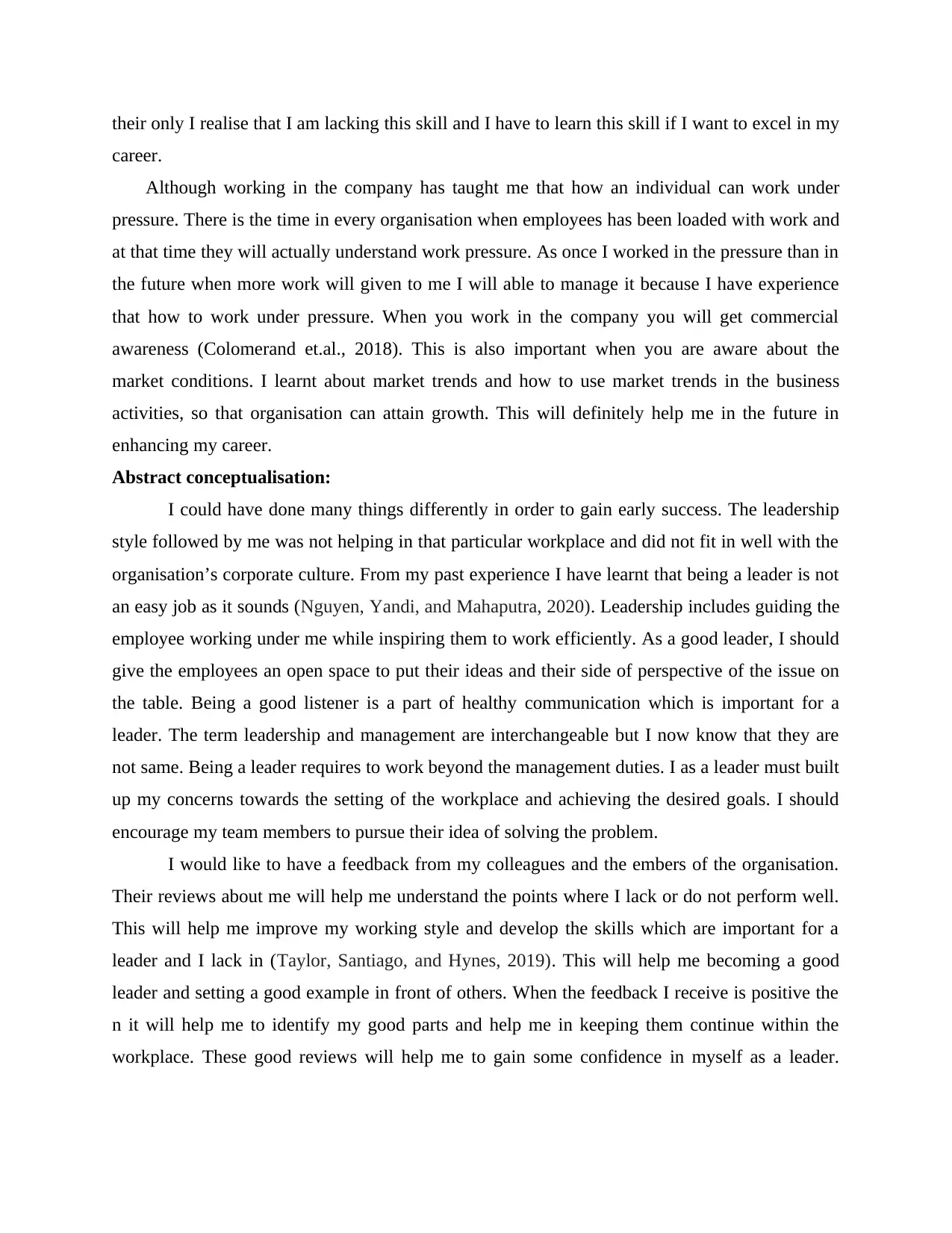
their only I realise that I am lacking this skill and I have to learn this skill if I want to excel in my
career.
Although working in the company has taught me that how an individual can work under
pressure. There is the time in every organisation when employees has been loaded with work and
at that time they will actually understand work pressure. As once I worked in the pressure than in
the future when more work will given to me I will able to manage it because I have experience
that how to work under pressure. When you work in the company you will get commercial
awareness (Colomerand et.al., 2018). This is also important when you are aware about the
market conditions. I learnt about market trends and how to use market trends in the business
activities, so that organisation can attain growth. This will definitely help me in the future in
enhancing my career.
Abstract conceptualisation:
I could have done many things differently in order to gain early success. The leadership
style followed by me was not helping in that particular workplace and did not fit in well with the
organisation’s corporate culture. From my past experience I have learnt that being a leader is not
an easy job as it sounds (Nguyen, Yandi, and Mahaputra, 2020). Leadership includes guiding the
employee working under me while inspiring them to work efficiently. As a good leader, I should
give the employees an open space to put their ideas and their side of perspective of the issue on
the table. Being a good listener is a part of healthy communication which is important for a
leader. The term leadership and management are interchangeable but I now know that they are
not same. Being a leader requires to work beyond the management duties. I as a leader must built
up my concerns towards the setting of the workplace and achieving the desired goals. I should
encourage my team members to pursue their idea of solving the problem.
I would like to have a feedback from my colleagues and the embers of the organisation.
Their reviews about me will help me understand the points where I lack or do not perform well.
This will help me improve my working style and develop the skills which are important for a
leader and I lack in (Taylor, Santiago, and Hynes, 2019). This will help me becoming a good
leader and setting a good example in front of others. When the feedback I receive is positive the
n it will help me to identify my good parts and help me in keeping them continue within the
workplace. These good reviews will help me to gain some confidence in myself as a leader.
career.
Although working in the company has taught me that how an individual can work under
pressure. There is the time in every organisation when employees has been loaded with work and
at that time they will actually understand work pressure. As once I worked in the pressure than in
the future when more work will given to me I will able to manage it because I have experience
that how to work under pressure. When you work in the company you will get commercial
awareness (Colomerand et.al., 2018). This is also important when you are aware about the
market conditions. I learnt about market trends and how to use market trends in the business
activities, so that organisation can attain growth. This will definitely help me in the future in
enhancing my career.
Abstract conceptualisation:
I could have done many things differently in order to gain early success. The leadership
style followed by me was not helping in that particular workplace and did not fit in well with the
organisation’s corporate culture. From my past experience I have learnt that being a leader is not
an easy job as it sounds (Nguyen, Yandi, and Mahaputra, 2020). Leadership includes guiding the
employee working under me while inspiring them to work efficiently. As a good leader, I should
give the employees an open space to put their ideas and their side of perspective of the issue on
the table. Being a good listener is a part of healthy communication which is important for a
leader. The term leadership and management are interchangeable but I now know that they are
not same. Being a leader requires to work beyond the management duties. I as a leader must built
up my concerns towards the setting of the workplace and achieving the desired goals. I should
encourage my team members to pursue their idea of solving the problem.
I would like to have a feedback from my colleagues and the embers of the organisation.
Their reviews about me will help me understand the points where I lack or do not perform well.
This will help me improve my working style and develop the skills which are important for a
leader and I lack in (Taylor, Santiago, and Hynes, 2019). This will help me becoming a good
leader and setting a good example in front of others. When the feedback I receive is positive the
n it will help me to identify my good parts and help me in keeping them continue within the
workplace. These good reviews will help me to gain some confidence in myself as a leader.
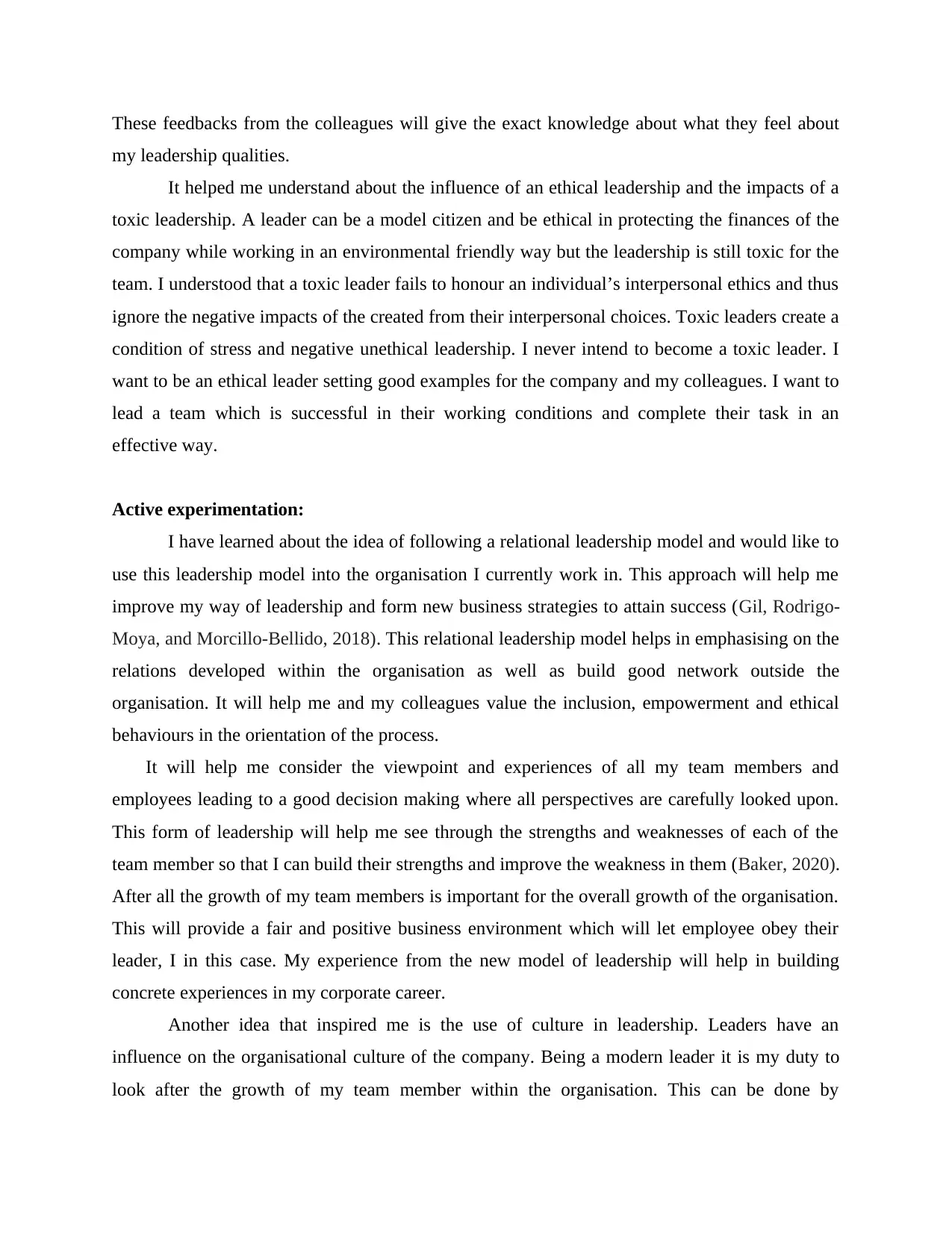
These feedbacks from the colleagues will give the exact knowledge about what they feel about
my leadership qualities.
It helped me understand about the influence of an ethical leadership and the impacts of a
toxic leadership. A leader can be a model citizen and be ethical in protecting the finances of the
company while working in an environmental friendly way but the leadership is still toxic for the
team. I understood that a toxic leader fails to honour an individual’s interpersonal ethics and thus
ignore the negative impacts of the created from their interpersonal choices. Toxic leaders create a
condition of stress and negative unethical leadership. I never intend to become a toxic leader. I
want to be an ethical leader setting good examples for the company and my colleagues. I want to
lead a team which is successful in their working conditions and complete their task in an
effective way.
Active experimentation:
I have learned about the idea of following a relational leadership model and would like to
use this leadership model into the organisation I currently work in. This approach will help me
improve my way of leadership and form new business strategies to attain success (Gil, Rodrigo-
Moya, and Morcillo-Bellido, 2018). This relational leadership model helps in emphasising on the
relations developed within the organisation as well as build good network outside the
organisation. It will help me and my colleagues value the inclusion, empowerment and ethical
behaviours in the orientation of the process.
It will help me consider the viewpoint and experiences of all my team members and
employees leading to a good decision making where all perspectives are carefully looked upon.
This form of leadership will help me see through the strengths and weaknesses of each of the
team member so that I can build their strengths and improve the weakness in them (Baker, 2020).
After all the growth of my team members is important for the overall growth of the organisation.
This will provide a fair and positive business environment which will let employee obey their
leader, I in this case. My experience from the new model of leadership will help in building
concrete experiences in my corporate career.
Another idea that inspired me is the use of culture in leadership. Leaders have an
influence on the organisational culture of the company. Being a modern leader it is my duty to
look after the growth of my team member within the organisation. This can be done by
my leadership qualities.
It helped me understand about the influence of an ethical leadership and the impacts of a
toxic leadership. A leader can be a model citizen and be ethical in protecting the finances of the
company while working in an environmental friendly way but the leadership is still toxic for the
team. I understood that a toxic leader fails to honour an individual’s interpersonal ethics and thus
ignore the negative impacts of the created from their interpersonal choices. Toxic leaders create a
condition of stress and negative unethical leadership. I never intend to become a toxic leader. I
want to be an ethical leader setting good examples for the company and my colleagues. I want to
lead a team which is successful in their working conditions and complete their task in an
effective way.
Active experimentation:
I have learned about the idea of following a relational leadership model and would like to
use this leadership model into the organisation I currently work in. This approach will help me
improve my way of leadership and form new business strategies to attain success (Gil, Rodrigo-
Moya, and Morcillo-Bellido, 2018). This relational leadership model helps in emphasising on the
relations developed within the organisation as well as build good network outside the
organisation. It will help me and my colleagues value the inclusion, empowerment and ethical
behaviours in the orientation of the process.
It will help me consider the viewpoint and experiences of all my team members and
employees leading to a good decision making where all perspectives are carefully looked upon.
This form of leadership will help me see through the strengths and weaknesses of each of the
team member so that I can build their strengths and improve the weakness in them (Baker, 2020).
After all the growth of my team members is important for the overall growth of the organisation.
This will provide a fair and positive business environment which will let employee obey their
leader, I in this case. My experience from the new model of leadership will help in building
concrete experiences in my corporate career.
Another idea that inspired me is the use of culture in leadership. Leaders have an
influence on the organisational culture of the company. Being a modern leader it is my duty to
look after the growth of my team member within the organisation. This can be done by
⊘ This is a preview!⊘
Do you want full access?
Subscribe today to unlock all pages.

Trusted by 1+ million students worldwide
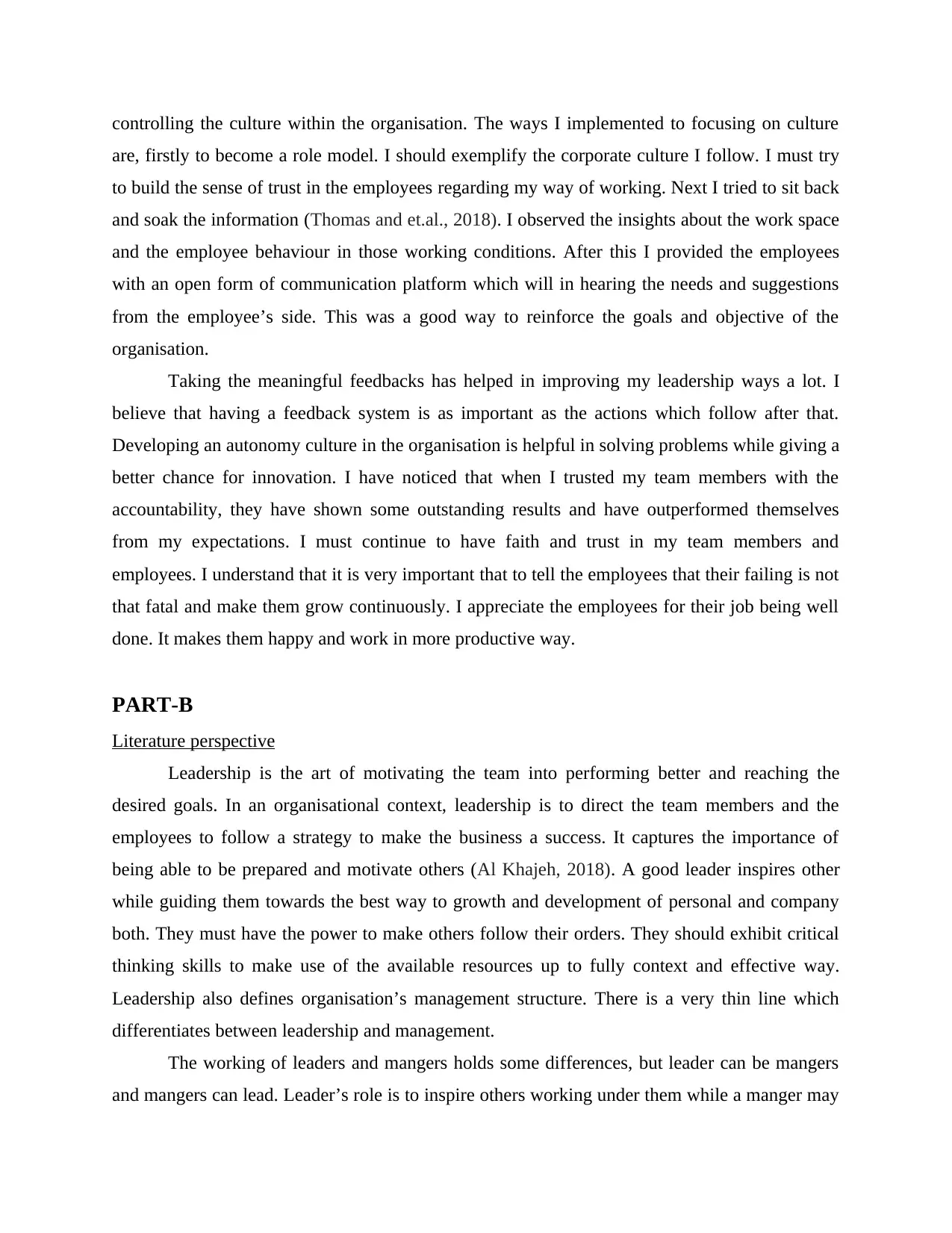
controlling the culture within the organisation. The ways I implemented to focusing on culture
are, firstly to become a role model. I should exemplify the corporate culture I follow. I must try
to build the sense of trust in the employees regarding my way of working. Next I tried to sit back
and soak the information (Thomas and et.al., 2018). I observed the insights about the work space
and the employee behaviour in those working conditions. After this I provided the employees
with an open form of communication platform which will in hearing the needs and suggestions
from the employee’s side. This was a good way to reinforce the goals and objective of the
organisation.
Taking the meaningful feedbacks has helped in improving my leadership ways a lot. I
believe that having a feedback system is as important as the actions which follow after that.
Developing an autonomy culture in the organisation is helpful in solving problems while giving a
better chance for innovation. I have noticed that when I trusted my team members with the
accountability, they have shown some outstanding results and have outperformed themselves
from my expectations. I must continue to have faith and trust in my team members and
employees. I understand that it is very important that to tell the employees that their failing is not
that fatal and make them grow continuously. I appreciate the employees for their job being well
done. It makes them happy and work in more productive way.
PART-B
Literature perspective
Leadership is the art of motivating the team into performing better and reaching the
desired goals. In an organisational context, leadership is to direct the team members and the
employees to follow a strategy to make the business a success. It captures the importance of
being able to be prepared and motivate others (Al Khajeh, 2018). A good leader inspires other
while guiding them towards the best way to growth and development of personal and company
both. They must have the power to make others follow their orders. They should exhibit critical
thinking skills to make use of the available resources up to fully context and effective way.
Leadership also defines organisation’s management structure. There is a very thin line which
differentiates between leadership and management.
The working of leaders and mangers holds some differences, but leader can be mangers
and mangers can lead. Leader’s role is to inspire others working under them while a manger may
are, firstly to become a role model. I should exemplify the corporate culture I follow. I must try
to build the sense of trust in the employees regarding my way of working. Next I tried to sit back
and soak the information (Thomas and et.al., 2018). I observed the insights about the work space
and the employee behaviour in those working conditions. After this I provided the employees
with an open form of communication platform which will in hearing the needs and suggestions
from the employee’s side. This was a good way to reinforce the goals and objective of the
organisation.
Taking the meaningful feedbacks has helped in improving my leadership ways a lot. I
believe that having a feedback system is as important as the actions which follow after that.
Developing an autonomy culture in the organisation is helpful in solving problems while giving a
better chance for innovation. I have noticed that when I trusted my team members with the
accountability, they have shown some outstanding results and have outperformed themselves
from my expectations. I must continue to have faith and trust in my team members and
employees. I understand that it is very important that to tell the employees that their failing is not
that fatal and make them grow continuously. I appreciate the employees for their job being well
done. It makes them happy and work in more productive way.
PART-B
Literature perspective
Leadership is the art of motivating the team into performing better and reaching the
desired goals. In an organisational context, leadership is to direct the team members and the
employees to follow a strategy to make the business a success. It captures the importance of
being able to be prepared and motivate others (Al Khajeh, 2018). A good leader inspires other
while guiding them towards the best way to growth and development of personal and company
both. They must have the power to make others follow their orders. They should exhibit critical
thinking skills to make use of the available resources up to fully context and effective way.
Leadership also defines organisation’s management structure. There is a very thin line which
differentiates between leadership and management.
The working of leaders and mangers holds some differences, but leader can be mangers
and mangers can lead. Leader’s role is to inspire others working under them while a manger may
Paraphrase This Document
Need a fresh take? Get an instant paraphrase of this document with our AI Paraphraser
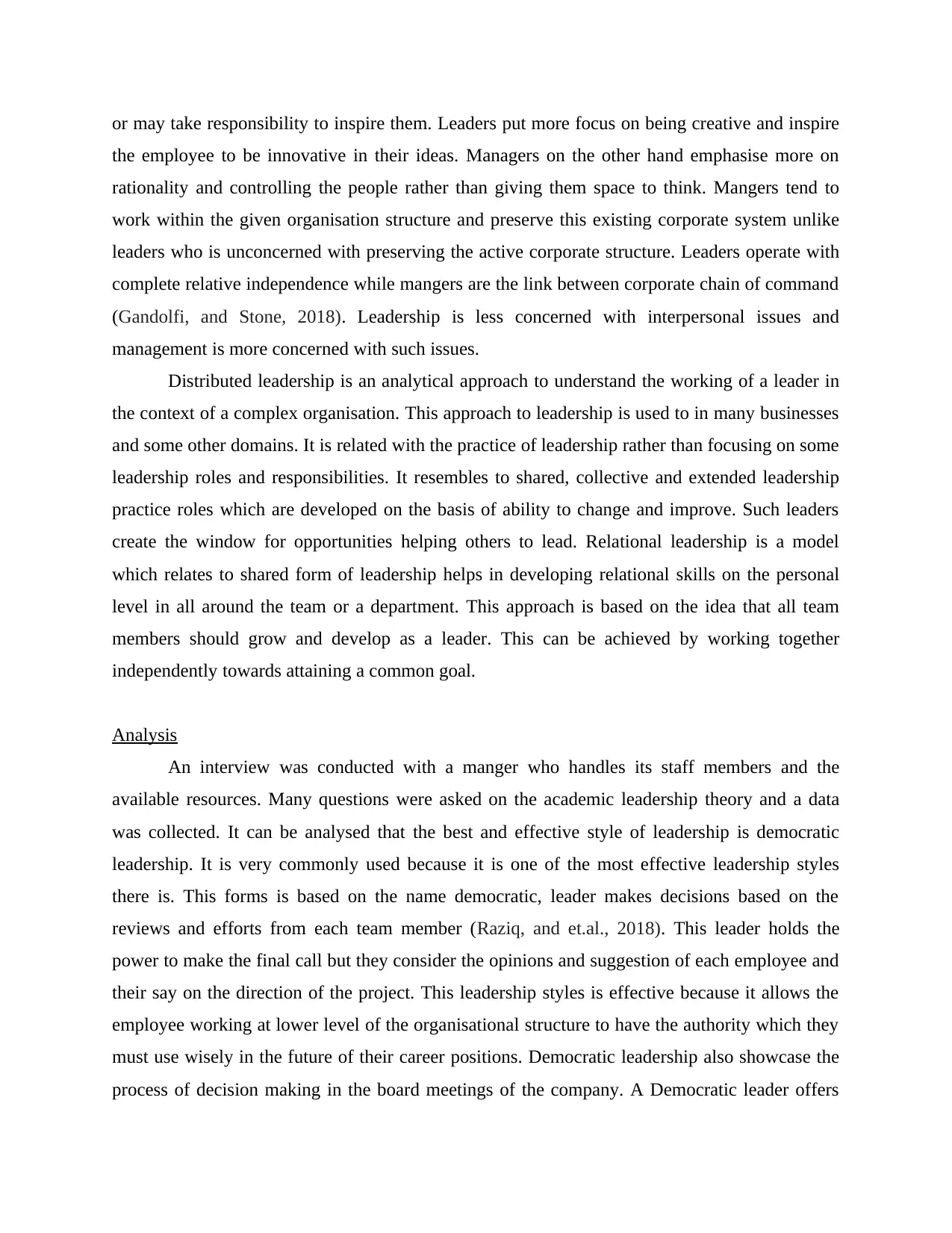
or may take responsibility to inspire them. Leaders put more focus on being creative and inspire
the employee to be innovative in their ideas. Managers on the other hand emphasise more on
rationality and controlling the people rather than giving them space to think. Mangers tend to
work within the given organisation structure and preserve this existing corporate system unlike
leaders who is unconcerned with preserving the active corporate structure. Leaders operate with
complete relative independence while mangers are the link between corporate chain of command
(Gandolfi, and Stone, 2018). Leadership is less concerned with interpersonal issues and
management is more concerned with such issues.
Distributed leadership is an analytical approach to understand the working of a leader in
the context of a complex organisation. This approach to leadership is used to in many businesses
and some other domains. It is related with the practice of leadership rather than focusing on some
leadership roles and responsibilities. It resembles to shared, collective and extended leadership
practice roles which are developed on the basis of ability to change and improve. Such leaders
create the window for opportunities helping others to lead. Relational leadership is a model
which relates to shared form of leadership helps in developing relational skills on the personal
level in all around the team or a department. This approach is based on the idea that all team
members should grow and develop as a leader. This can be achieved by working together
independently towards attaining a common goal.
Analysis
An interview was conducted with a manger who handles its staff members and the
available resources. Many questions were asked on the academic leadership theory and a data
was collected. It can be analysed that the best and effective style of leadership is democratic
leadership. It is very commonly used because it is one of the most effective leadership styles
there is. This forms is based on the name democratic, leader makes decisions based on the
reviews and efforts from each team member (Raziq, and et.al., 2018). This leader holds the
power to make the final call but they consider the opinions and suggestion of each employee and
their say on the direction of the project. This leadership styles is effective because it allows the
employee working at lower level of the organisational structure to have the authority which they
must use wisely in the future of their career positions. Democratic leadership also showcase the
process of decision making in the board meetings of the company. A Democratic leader offers
the employee to be innovative in their ideas. Managers on the other hand emphasise more on
rationality and controlling the people rather than giving them space to think. Mangers tend to
work within the given organisation structure and preserve this existing corporate system unlike
leaders who is unconcerned with preserving the active corporate structure. Leaders operate with
complete relative independence while mangers are the link between corporate chain of command
(Gandolfi, and Stone, 2018). Leadership is less concerned with interpersonal issues and
management is more concerned with such issues.
Distributed leadership is an analytical approach to understand the working of a leader in
the context of a complex organisation. This approach to leadership is used to in many businesses
and some other domains. It is related with the practice of leadership rather than focusing on some
leadership roles and responsibilities. It resembles to shared, collective and extended leadership
practice roles which are developed on the basis of ability to change and improve. Such leaders
create the window for opportunities helping others to lead. Relational leadership is a model
which relates to shared form of leadership helps in developing relational skills on the personal
level in all around the team or a department. This approach is based on the idea that all team
members should grow and develop as a leader. This can be achieved by working together
independently towards attaining a common goal.
Analysis
An interview was conducted with a manger who handles its staff members and the
available resources. Many questions were asked on the academic leadership theory and a data
was collected. It can be analysed that the best and effective style of leadership is democratic
leadership. It is very commonly used because it is one of the most effective leadership styles
there is. This forms is based on the name democratic, leader makes decisions based on the
reviews and efforts from each team member (Raziq, and et.al., 2018). This leader holds the
power to make the final call but they consider the opinions and suggestion of each employee and
their say on the direction of the project. This leadership styles is effective because it allows the
employee working at lower level of the organisational structure to have the authority which they
must use wisely in the future of their career positions. Democratic leadership also showcase the
process of decision making in the board meetings of the company. A Democratic leader offers
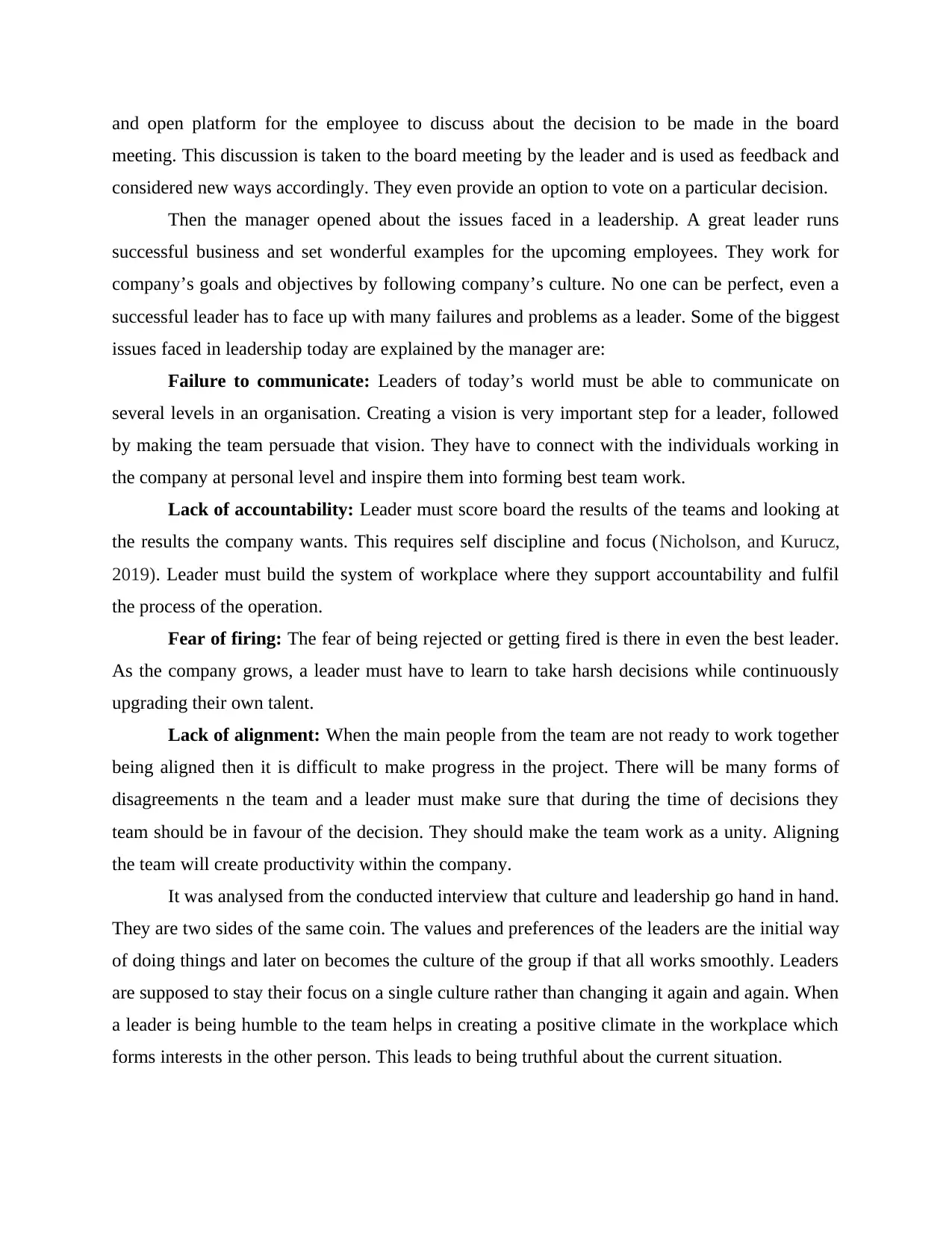
and open platform for the employee to discuss about the decision to be made in the board
meeting. This discussion is taken to the board meeting by the leader and is used as feedback and
considered new ways accordingly. They even provide an option to vote on a particular decision.
Then the manager opened about the issues faced in a leadership. A great leader runs
successful business and set wonderful examples for the upcoming employees. They work for
company’s goals and objectives by following company’s culture. No one can be perfect, even a
successful leader has to face up with many failures and problems as a leader. Some of the biggest
issues faced in leadership today are explained by the manager are:
Failure to communicate: Leaders of today’s world must be able to communicate on
several levels in an organisation. Creating a vision is very important step for a leader, followed
by making the team persuade that vision. They have to connect with the individuals working in
the company at personal level and inspire them into forming best team work.
Lack of accountability: Leader must score board the results of the teams and looking at
the results the company wants. This requires self discipline and focus (Nicholson, and Kurucz,
2019). Leader must build the system of workplace where they support accountability and fulfil
the process of the operation.
Fear of firing: The fear of being rejected or getting fired is there in even the best leader.
As the company grows, a leader must have to learn to take harsh decisions while continuously
upgrading their own talent.
Lack of alignment: When the main people from the team are not ready to work together
being aligned then it is difficult to make progress in the project. There will be many forms of
disagreements n the team and a leader must make sure that during the time of decisions they
team should be in favour of the decision. They should make the team work as a unity. Aligning
the team will create productivity within the company.
It was analysed from the conducted interview that culture and leadership go hand in hand.
They are two sides of the same coin. The values and preferences of the leaders are the initial way
of doing things and later on becomes the culture of the group if that all works smoothly. Leaders
are supposed to stay their focus on a single culture rather than changing it again and again. When
a leader is being humble to the team helps in creating a positive climate in the workplace which
forms interests in the other person. This leads to being truthful about the current situation.
meeting. This discussion is taken to the board meeting by the leader and is used as feedback and
considered new ways accordingly. They even provide an option to vote on a particular decision.
Then the manager opened about the issues faced in a leadership. A great leader runs
successful business and set wonderful examples for the upcoming employees. They work for
company’s goals and objectives by following company’s culture. No one can be perfect, even a
successful leader has to face up with many failures and problems as a leader. Some of the biggest
issues faced in leadership today are explained by the manager are:
Failure to communicate: Leaders of today’s world must be able to communicate on
several levels in an organisation. Creating a vision is very important step for a leader, followed
by making the team persuade that vision. They have to connect with the individuals working in
the company at personal level and inspire them into forming best team work.
Lack of accountability: Leader must score board the results of the teams and looking at
the results the company wants. This requires self discipline and focus (Nicholson, and Kurucz,
2019). Leader must build the system of workplace where they support accountability and fulfil
the process of the operation.
Fear of firing: The fear of being rejected or getting fired is there in even the best leader.
As the company grows, a leader must have to learn to take harsh decisions while continuously
upgrading their own talent.
Lack of alignment: When the main people from the team are not ready to work together
being aligned then it is difficult to make progress in the project. There will be many forms of
disagreements n the team and a leader must make sure that during the time of decisions they
team should be in favour of the decision. They should make the team work as a unity. Aligning
the team will create productivity within the company.
It was analysed from the conducted interview that culture and leadership go hand in hand.
They are two sides of the same coin. The values and preferences of the leaders are the initial way
of doing things and later on becomes the culture of the group if that all works smoothly. Leaders
are supposed to stay their focus on a single culture rather than changing it again and again. When
a leader is being humble to the team helps in creating a positive climate in the workplace which
forms interests in the other person. This leads to being truthful about the current situation.
⊘ This is a preview!⊘
Do you want full access?
Subscribe today to unlock all pages.

Trusted by 1+ million students worldwide
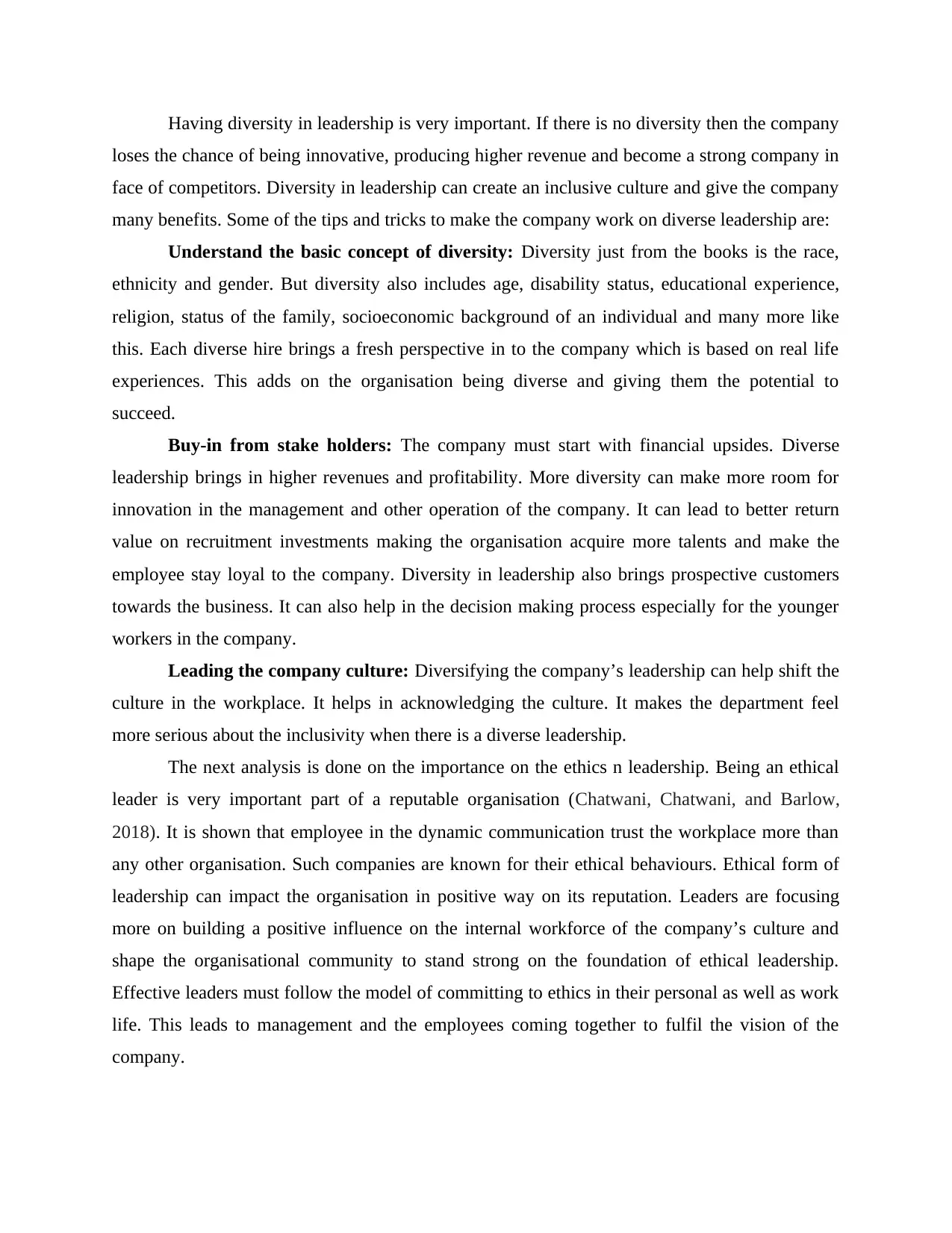
Having diversity in leadership is very important. If there is no diversity then the company
loses the chance of being innovative, producing higher revenue and become a strong company in
face of competitors. Diversity in leadership can create an inclusive culture and give the company
many benefits. Some of the tips and tricks to make the company work on diverse leadership are:
Understand the basic concept of diversity: Diversity just from the books is the race,
ethnicity and gender. But diversity also includes age, disability status, educational experience,
religion, status of the family, socioeconomic background of an individual and many more like
this. Each diverse hire brings a fresh perspective in to the company which is based on real life
experiences. This adds on the organisation being diverse and giving them the potential to
succeed.
Buy-in from stake holders: The company must start with financial upsides. Diverse
leadership brings in higher revenues and profitability. More diversity can make more room for
innovation in the management and other operation of the company. It can lead to better return
value on recruitment investments making the organisation acquire more talents and make the
employee stay loyal to the company. Diversity in leadership also brings prospective customers
towards the business. It can also help in the decision making process especially for the younger
workers in the company.
Leading the company culture: Diversifying the company’s leadership can help shift the
culture in the workplace. It helps in acknowledging the culture. It makes the department feel
more serious about the inclusivity when there is a diverse leadership.
The next analysis is done on the importance on the ethics n leadership. Being an ethical
leader is very important part of a reputable organisation (Chatwani, Chatwani, and Barlow,
2018). It is shown that employee in the dynamic communication trust the workplace more than
any other organisation. Such companies are known for their ethical behaviours. Ethical form of
leadership can impact the organisation in positive way on its reputation. Leaders are focusing
more on building a positive influence on the internal workforce of the company’s culture and
shape the organisational community to stand strong on the foundation of ethical leadership.
Effective leaders must follow the model of committing to ethics in their personal as well as work
life. This leads to management and the employees coming together to fulfil the vision of the
company.
loses the chance of being innovative, producing higher revenue and become a strong company in
face of competitors. Diversity in leadership can create an inclusive culture and give the company
many benefits. Some of the tips and tricks to make the company work on diverse leadership are:
Understand the basic concept of diversity: Diversity just from the books is the race,
ethnicity and gender. But diversity also includes age, disability status, educational experience,
religion, status of the family, socioeconomic background of an individual and many more like
this. Each diverse hire brings a fresh perspective in to the company which is based on real life
experiences. This adds on the organisation being diverse and giving them the potential to
succeed.
Buy-in from stake holders: The company must start with financial upsides. Diverse
leadership brings in higher revenues and profitability. More diversity can make more room for
innovation in the management and other operation of the company. It can lead to better return
value on recruitment investments making the organisation acquire more talents and make the
employee stay loyal to the company. Diversity in leadership also brings prospective customers
towards the business. It can also help in the decision making process especially for the younger
workers in the company.
Leading the company culture: Diversifying the company’s leadership can help shift the
culture in the workplace. It helps in acknowledging the culture. It makes the department feel
more serious about the inclusivity when there is a diverse leadership.
The next analysis is done on the importance on the ethics n leadership. Being an ethical
leader is very important part of a reputable organisation (Chatwani, Chatwani, and Barlow,
2018). It is shown that employee in the dynamic communication trust the workplace more than
any other organisation. Such companies are known for their ethical behaviours. Ethical form of
leadership can impact the organisation in positive way on its reputation. Leaders are focusing
more on building a positive influence on the internal workforce of the company’s culture and
shape the organisational community to stand strong on the foundation of ethical leadership.
Effective leaders must follow the model of committing to ethics in their personal as well as work
life. This leads to management and the employees coming together to fulfil the vision of the
company.
Paraphrase This Document
Need a fresh take? Get an instant paraphrase of this document with our AI Paraphraser
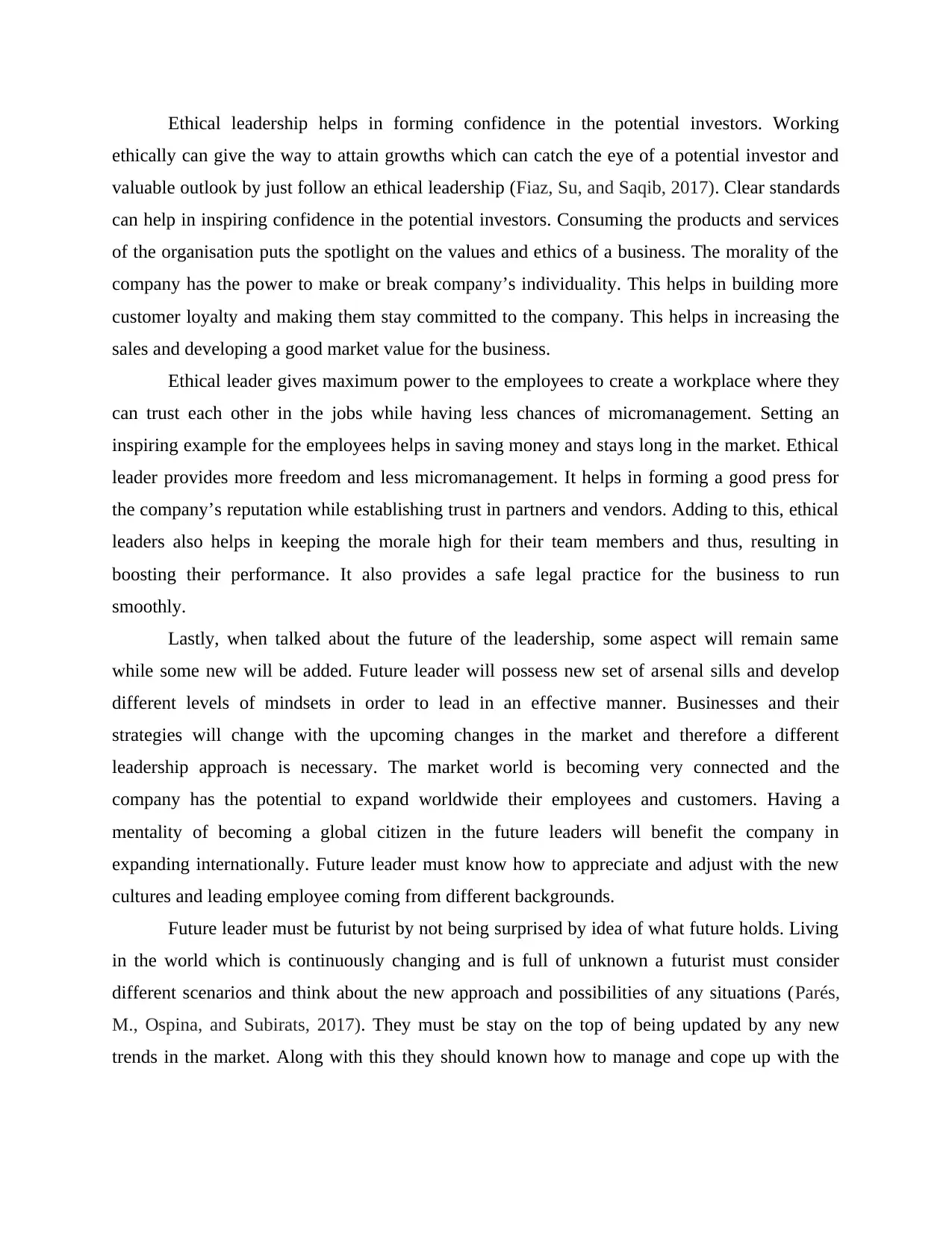
Ethical leadership helps in forming confidence in the potential investors. Working
ethically can give the way to attain growths which can catch the eye of a potential investor and
valuable outlook by just follow an ethical leadership (Fiaz, Su, and Saqib, 2017). Clear standards
can help in inspiring confidence in the potential investors. Consuming the products and services
of the organisation puts the spotlight on the values and ethics of a business. The morality of the
company has the power to make or break company’s individuality. This helps in building more
customer loyalty and making them stay committed to the company. This helps in increasing the
sales and developing a good market value for the business.
Ethical leader gives maximum power to the employees to create a workplace where they
can trust each other in the jobs while having less chances of micromanagement. Setting an
inspiring example for the employees helps in saving money and stays long in the market. Ethical
leader provides more freedom and less micromanagement. It helps in forming a good press for
the company’s reputation while establishing trust in partners and vendors. Adding to this, ethical
leaders also helps in keeping the morale high for their team members and thus, resulting in
boosting their performance. It also provides a safe legal practice for the business to run
smoothly.
Lastly, when talked about the future of the leadership, some aspect will remain same
while some new will be added. Future leader will possess new set of arsenal sills and develop
different levels of mindsets in order to lead in an effective manner. Businesses and their
strategies will change with the upcoming changes in the market and therefore a different
leadership approach is necessary. The market world is becoming very connected and the
company has the potential to expand worldwide their employees and customers. Having a
mentality of becoming a global citizen in the future leaders will benefit the company in
expanding internationally. Future leader must know how to appreciate and adjust with the new
cultures and leading employee coming from different backgrounds.
Future leader must be futurist by not being surprised by idea of what future holds. Living
in the world which is continuously changing and is full of unknown a futurist must consider
different scenarios and think about the new approach and possibilities of any situations (Parés,
M., Ospina, and Subirats, 2017). They must be stay on the top of being updated by any new
trends in the market. Along with this they should known how to manage and cope up with the
ethically can give the way to attain growths which can catch the eye of a potential investor and
valuable outlook by just follow an ethical leadership (Fiaz, Su, and Saqib, 2017). Clear standards
can help in inspiring confidence in the potential investors. Consuming the products and services
of the organisation puts the spotlight on the values and ethics of a business. The morality of the
company has the power to make or break company’s individuality. This helps in building more
customer loyalty and making them stay committed to the company. This helps in increasing the
sales and developing a good market value for the business.
Ethical leader gives maximum power to the employees to create a workplace where they
can trust each other in the jobs while having less chances of micromanagement. Setting an
inspiring example for the employees helps in saving money and stays long in the market. Ethical
leader provides more freedom and less micromanagement. It helps in forming a good press for
the company’s reputation while establishing trust in partners and vendors. Adding to this, ethical
leaders also helps in keeping the morale high for their team members and thus, resulting in
boosting their performance. It also provides a safe legal practice for the business to run
smoothly.
Lastly, when talked about the future of the leadership, some aspect will remain same
while some new will be added. Future leader will possess new set of arsenal sills and develop
different levels of mindsets in order to lead in an effective manner. Businesses and their
strategies will change with the upcoming changes in the market and therefore a different
leadership approach is necessary. The market world is becoming very connected and the
company has the potential to expand worldwide their employees and customers. Having a
mentality of becoming a global citizen in the future leaders will benefit the company in
expanding internationally. Future leader must know how to appreciate and adjust with the new
cultures and leading employee coming from different backgrounds.
Future leader must be futurist by not being surprised by idea of what future holds. Living
in the world which is continuously changing and is full of unknown a futurist must consider
different scenarios and think about the new approach and possibilities of any situations (Parés,
M., Ospina, and Subirats, 2017). They must be stay on the top of being updated by any new
trends in the market. Along with this they should known how to manage and cope up with the
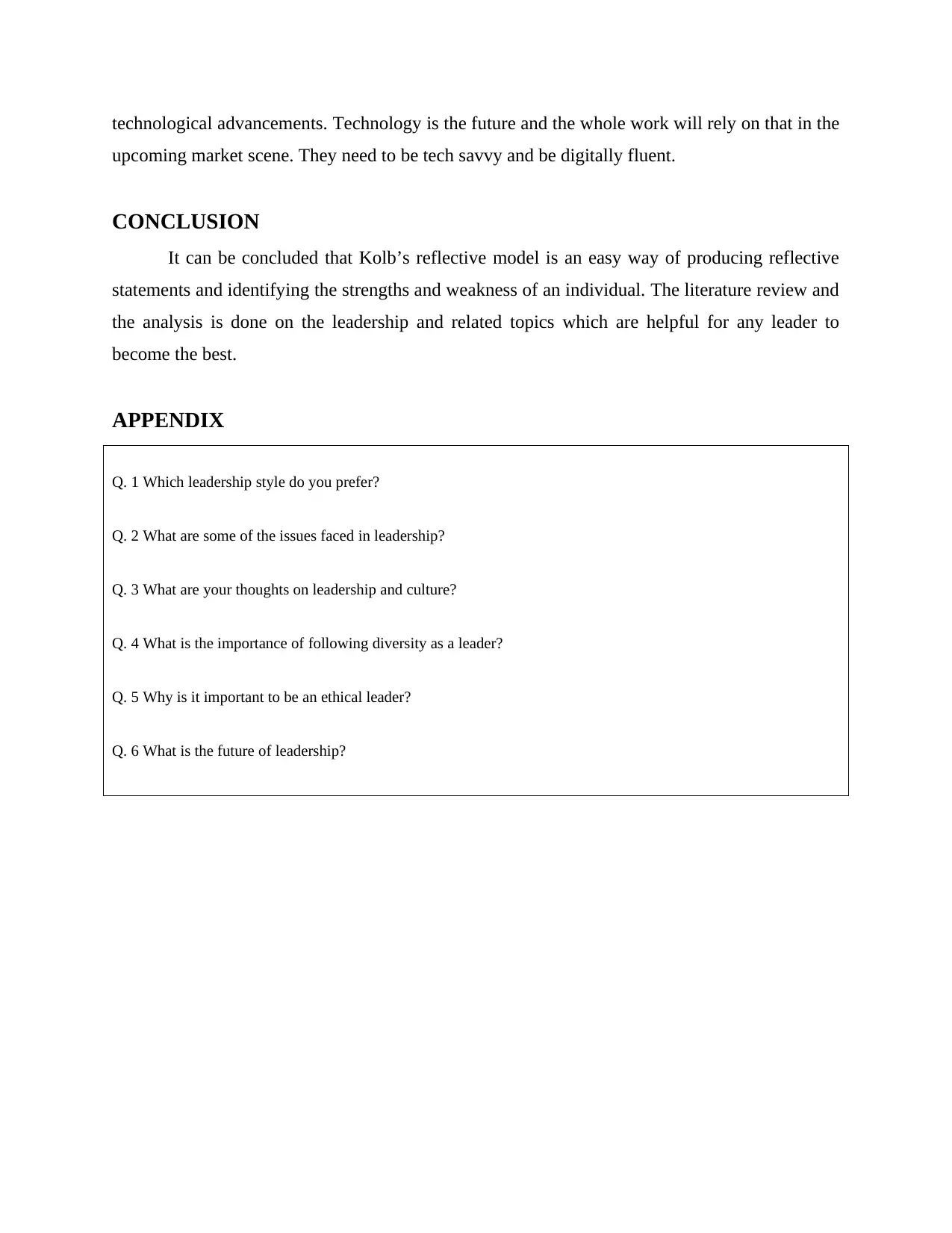
technological advancements. Technology is the future and the whole work will rely on that in the
upcoming market scene. They need to be tech savvy and be digitally fluent.
CONCLUSION
It can be concluded that Kolb’s reflective model is an easy way of producing reflective
statements and identifying the strengths and weakness of an individual. The literature review and
the analysis is done on the leadership and related topics which are helpful for any leader to
become the best.
APPENDIX
Q. 1 Which leadership style do you prefer?
Q. 2 What are some of the issues faced in leadership?
Q. 3 What are your thoughts on leadership and culture?
Q. 4 What is the importance of following diversity as a leader?
Q. 5 Why is it important to be an ethical leader?
Q. 6 What is the future of leadership?
upcoming market scene. They need to be tech savvy and be digitally fluent.
CONCLUSION
It can be concluded that Kolb’s reflective model is an easy way of producing reflective
statements and identifying the strengths and weakness of an individual. The literature review and
the analysis is done on the leadership and related topics which are helpful for any leader to
become the best.
APPENDIX
Q. 1 Which leadership style do you prefer?
Q. 2 What are some of the issues faced in leadership?
Q. 3 What are your thoughts on leadership and culture?
Q. 4 What is the importance of following diversity as a leader?
Q. 5 Why is it important to be an ethical leader?
Q. 6 What is the future of leadership?
⊘ This is a preview!⊘
Do you want full access?
Subscribe today to unlock all pages.

Trusted by 1+ million students worldwide
1 out of 14
Related Documents
Your All-in-One AI-Powered Toolkit for Academic Success.
+13062052269
info@desklib.com
Available 24*7 on WhatsApp / Email
![[object Object]](/_next/static/media/star-bottom.7253800d.svg)
Unlock your academic potential
Copyright © 2020–2026 A2Z Services. All Rights Reserved. Developed and managed by ZUCOL.





